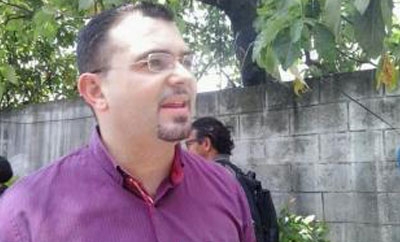Authorities in El Salvador have arrested a priest and youth worker who has operated as a key intermediary with “mara” street gangs, in a strong indication the new government is looking to push certain players out of any future negotiation process.
Spanish priest Father Antonio Rodriguez was detained on July 30 on charges of bringing illegal objects into the country’s prisons, illicit association and influence trafficking. The objects in question allegedly included drugs, cash and cell phones brought into the Cojutepeque and Izalco prisons, according to La Pagina.
According to the Attorney General’s Office, the actions of Rodriguez — who is popularly known as “Padre Toño” — helped gang members continue committing crimes. Based on recordings of telephone conversations, the body claims he worked with imprisoned Barrio 18 gang leader Carlos Ernesto Mojica Lechuga, alias “El Viejo Lin,” performing favors such as prisoner transfers on his behalf and bringing in cell phones used to commit extortion, reported La Prensa Grafica.
Following protests in support of the priest a San Salvador court granted him conditional liberty on August 4 as proceedings continue, reported El Diario de Hoy
InSight Crime Analysis
Father Antonio Rodriguez, a Spanish priest who heads a church in the greater San Salvador area, has been an important and often controversial intermediary between civil society and El Salvador’s two main street gangs — Barrio 18 and the Mara Salvatrucha (MS13).
Padre Toño has long advocated for dialogue with the gangs but was initially opposed to the truce struck between the two sides in March 2012. However, he climbed on board with the initiative after a close associate of his who worked with former gang members was murdered.
Rodriguez was a member of one of two camps of intermediaries, the other of which was led by Raul Mijango and Bishop Fabio Colindres, who were instrumental in brokering the initial agreement. These original mediators were largely sidelined by the previous government after former Security Minister Ricardo Perdomo — a major truce critic — came into office in mid-2013. Since then, the truce has slowly fallen apart, and murders are now back at pre-truce levels.
The priest later teamed up with Perdomo to plan a new peace process — which had the backing of the US government but was flatly rejected by the gangs — leading to accusations he was attempting to usurp Mijango and Colindres. Perdomo shut down the communication channels that had previously been used to facilitate gang negotiations, but reportedly gave Padre Toño permission to enter the prisons.
SEE ALSO: El Salvador Gang Truce: Positives and Negatives
Padre Toño’s arrest suggests the new government of President Salvador Sanchez Ceren is looking to push his team — and by extension possibly Perdomo — out of the process. While they have not said they will formally support Mijango and Colindres, Security Minister Benito Lara said in July the government would not block any attempts at gang negotiations.

